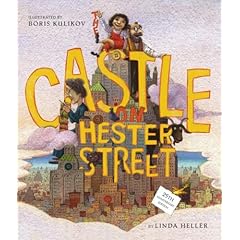
Originally published in 1951, Sydney Taylor's novel, All of A Kind Family, is set in New York City around 1912. The family consists of a mom, a dad, and five "step and stair" daughters. (They range in age from twelve to four.) The book is about the adventures the five sisters have together. It's definitely not your typical book if you're judging it by modern standards. There is less plot, for one thing, but the charm--or part of the charm--is in the individual stories, the episodes. The fact that it is more a compilation of loosely connected stories masquerading as a novel isn't a problem in my opinion. (But I'm curious what modern children would make of it all???)
The book does have its charms. There's no doubt about that. And one of the things I do like about the book is the fact that it highlights so many different aspects of being Jewish. For example, I haven't come across too many fiction novels (or picture books for that matter) that show families celebrating Purim and Succos. (These aren't the only celebrations by any means.) It was just interesting to see these aspects of culture and religion interwoven with the typical and traditional threads of family life and social life--going to school, going to the library, going to the beach, going shopping, getting a new baby, etc.
Part of me is curious as to how modern readers would respond to this novel and others like it. Would it be considered too old fashioned? Too dated? Too boring? While I can appreciate it the novel as an adult, I'm not sure what I would have thought of it as a child.
For example, the chapter that is really "out there" for me is how the mother tricks the children into doing housework. The chapter is called "Dusting is Fun." And it doesn't matter if you're 8 or 9 or 29, you KNOW that that sentence is a lie and always will be a lie. The mother successfully tricks her five children into playing a game "find the buttons while you dust" to get them to do their least favorite chore each week. I don't buy it. It's not like finding a button is a great reward. It's not like they get to keep the button. It's not like they can trade the buttons for a penny or two to keep. They're just finding the same buttons over and over again each week and making it an-ever-so-fun game. I just don't buy it at all.
However, the rest of the chapters do work for me for the most part.
First sentence: "That slowpoke Sarah!" Henny cried. "She's making us late!" Mama's girls were going to the library, and Henny was impatient.
It is 189 pages.



 Review of Book: Night
Review of Book: Night


